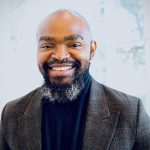 Kim Gans was featured in UConn Today about a program designed to reduce social isolation impacting homebound older adults: Read the article here https://today.uconn.edu/2025/11/training-program-delivers-resources-to-reduce-social-isolation-among-seniors/
Kim Gans was featured in UConn Today about a program designed to reduce social isolation impacting homebound older adults: Read the article here https://today.uconn.edu/2025/11/training-program-delivers-resources-to-reduce-social-isolation-among-seniors/
Faculty
Maria LaRusso, Faculty Spotlight, November 2025
Kari Adamsons, HDFS Faculty Spotlight, October 2025

Kari was promoted to Professor effective August, 2025!
Dr. Kari Adamsons came to UConn 18 years ago, in 2007, following a fairly winding journey. She spent her first two years of college as an international relations major with a specialization in Russian foreign policy (which continues to come in dismayingly handy in recent years). However, she soon realized that although international politics are fascinating, that was something she’d rather learn about as a hobby than pursue as a career. Instead, she switched tracks and obtained a BA in psychology. She then moved to North Carolina and spent six years working as a paralegal for an insurance defense law firm. She eventually dropped back to working part-time at the law firm and pursued her Master’s in HDFS at University of North Carolina at Greensboro (UNCG), with a plan to DFSwork with non-profit agencies. However, after an internship with a non-profit during her Master’s program, she realized that also was not the career for her (too much bureaucracy!). Research, however, seemed pretty interesting, so she left the law firm and went back to school full time to get her PhD in HDFS at UNCG. After graduating and completing a one-year post-doctoral fellowship with UNCG’s Center for Youth, Family, and Community Partnerships, she joined UConn as an Assistant Professor of HDFS. Now a Professor, her favorite part of the job is that there are so many different parts to her job. She loves the energy involved in teaching and mentoring, and then recharging by hiding in her office and analyzing data, intermingled with occasional community trainings and applied work to remind her why she studies the things she does.
Broadly speaking, Kari studies fathers, which has allowed her to dabble in a number of different content areas; by simply adding the phrase “with fathers” to any subject, any area is open for exploration! To date, she has examined subjects such as the development and expression of fathering identities during the transition to parenthood, fathers’ influence on child obesity, nonresident fathering and shared parenting following divorce (and recently, during COVID), and most recently, the processes involved in the transmission of risk behaviors such as substance use between fathers and adolescent children. Her passion for understanding and including fathers dates back to an independent study in college. At the time, Kari was interested in child abuse prevention, and a local children’s advocacy organization requested research on whether fathers influenced children’s outcomes and should, therefore, be included in their abuse prevention efforts (then exclusively focused on mothers). Spoiler alert: the answer was yes, they do, and yes, they should. Carrying that experience into graduate school, Kari noticed that in every class about parents and families, the research talked about “parents,” but the samples only included mothers, meaning little was known about fathers. Kari has spent her career trying to answer all of those unanswered questions. Kari also is fascinated by theories and methodologies, and especially the ways that our theoretical lens or methodology not only influences our interpretation of our results, but often shapes the results themselves.
When she’s not working, Kari enjoys relaxing at home in the woods of Columbia, CT, with her husband, Jim, and the family pets. Those pets currently include 2 English Setters and 3 aquariums, but have, at various times, also included numerous pet chickens and rats. She’s a fanatic about the Washington Capitals, Dallas Cowboys, Boston Red Sox, and UConn basketball (women’s and men’s), and she also enjoys watching golf and tennis. She enjoys watching them precisely because she is skilled at exactly zero of those sports herself. When not watching sports, she is probably catching a show at either Hartford Stage or the Bushnell Theater, particularly if a Broadway production is in town.
Terry Berthelot, HDFS Faculty Spotlight, September 2025
 Terry was promoted to Associate Professor-in-Residence effective August, 2025!
Terry was promoted to Associate Professor-in-Residence effective August, 2025!
Terry Berthelot joined the HDFS Department in 2016. Her research and advocacy efforts are primarily about access to healthcare for people who are sixty-five and older and for people living with disabilities. She received her master’s degree in social work (MSW) from Syracuse University after which she worked as a community developer within Syracuse’s Economic Development Zone. She then moved to Mississippi, where she directed a Joint Commission Accredited hospice program. Finding herself fascinated by the legal and ethical questions surrounding death and dying, Terry pursued her law degree at the University of Mississippi (Ole Miss). While at Ole Miss, she participated in post-conviction death penalty mitigation appeals. After graduating from law school, she joined the Center for Medicare Advocacy (CMA), a national not-for-profit law firm that, through education and advocacy, works to ensure that people who are sixty-five and older and people with disabilities have access to excellent healthcare and insurance coverage for that care. Terry is currently a member of the National Academy of Elder Law Attorneys’ (NAELA) Board of Directors and is on the editorial board for NAELA News. She and her spouse have a remarkable teen-age daughter and a reasonably well behaved three-year-old dog. They spend as much time as they can cruising their sailboat, Finisterre.
Candi Nwakasi selected as UConn Pepper Scholar
 Candi Nwakasi was featured in UConn Today for his recent selection as a UConn Pepper Scholar. Read all about it in UConn Today https://today.uconn.edu/2025/08/meet-uconn-pepper-centers-2025-rec-pepper-scholars/
Candi Nwakasi was featured in UConn Today for his recent selection as a UConn Pepper Scholar. Read all about it in UConn Today https://today.uconn.edu/2025/08/meet-uconn-pepper-centers-2025-rec-pepper-scholars/
Preston Britner, PhD, HDFS Faculty Spotlight, August 2025
 Preston Britner is a Professor of HDFS who has been on the faculty at UConn since 1997. “Brit” has been active in many service roles at department, college, university, state, and national professional organization levels throughout his time in Storrs.
Preston Britner is a Professor of HDFS who has been on the faculty at UConn since 1997. “Brit” has been active in many service roles at department, college, university, state, and national professional organization levels throughout his time in Storrs.
Brit was born in Washington, DC, and grew up in Northern Virginia. A first-generation college student, he completed his BA in psychology at the University of Miami, where he also captained the varsity track team, and his MA and PhD in developmental psychology at the University of Virginia, where he contributed to studies of child-parent attachment, child care, and child maltreatment prevention.
At UConn, Professor Britner has researched a number of topics (e.g., attachment-caregiving relationships; youth mentoring; prevention programs) with a focus on the application of child development and parent-child family relationship theory and research to applied settings (i.e., translational science), geared toward the promotion of healthy interactions and the prevention of negative behavioral outcomes. Much of his current research focuses on interventions for families with children in foster care. Brit is examining the effectiveness of college preparatory programs for high school youth in foster care, as well as looking at eventual college attainment for youth in care (and what factors influence those educational outcomes). Since 2001, he has been involved with the study and refinement of the Supportive Housing for Families (SHF) housing and child welfare intervention for families with children in, or at risk for, foster care. SHF is a national model of a community-based, family-focused intervention that was developed and studied collaboratively with state and nonprofit provider partners.
In addition to publishing two books and dozens of articles and chapters (most with student co-authors), Dr. Britner routinely testifies at state and federal hearings and briefings in Hartford and DC. He has served on numerous editorial advisory boards and was the Editor of the Journal of Prevention. A Fellow of the American Psychological Association (APA), Brit served as Co-Chair of the Committee on Children, Youth, and Families, leading APA’s policy efforts related to children and families. In Connecticut, he was Co-Chair of the Families with Service Needs Advisory Board at the legislature, working to improve supportive services for “status offender” children and their families.
At UConn, Professor Britner has chaired the Faculty Review Board, the Faculty Standards and Student Welfare committees of the University Senate, the Planning and Evaluation Committee for university accreditation, and the Teaching and Learning Advisory Board. Brit co-chaired the 2009 University Metanoia on “Preventing Violence against Women.” He was Co-Chair (2008-2012) of the Public Engagement Forum and the lead author of UConn’s successful 2010 Carnegie Foundation “Community Engagement” classification application. In the department, Professor Britner served as Associate Department Head (2006-2008) and Associate Department Head for Graduate Studies (2008-2010; 2019-2023).
Dr. Britner has been recognized as a University Teaching Fellow (2003) and with the AAUP Service Excellence Award (2011), the Philip E. Austin Endowed Chair (2013-2016; the first UConn HDFS faculty member to hold an endowed chair), the Provost’s Award for Excellence in Public Engagement (2015), and the 2019 Edward C. Marth Mentorship Award (outstanding mentoring of graduate students).
In 2023, he won the Distinguished Provost’s Outstanding Service Award for exemplary service and making an indelible impact to enhance the University’s mission. At the ceremony, the Provost shared the number and scope of Brit’s current service roles, prompting gasps from the audience and a re-thinking of when to say “no” from the award recipient.
Kim Gans and Beth Russell featured in UConn Today


Kim Gans and Beth Russell were featured in UConn Today for their participation in InCHIP’s Community Engagement Research Core’s networking event.
HDFS faculty and grad students present research at APA Conference
Five HDFS faculty and six graduate students will be giving seven presentations at the 2025 American Psychological Association conference in Denver. See the full list here
Rebecca Puhl keynote speaker at ASMBS conference
 Rebecca Puhl gave the keynote address at the national American Society of Metabolic and Bariatric Surgery (ASMBS) Annual Conference in Washington, D.C. This conference brings together 3,000 surgeons, integrated health professionals, and industry leaders from over 40 countries. Her presentation, Confronting Weight Stigma: Understanding its Harms and Embracing Pathways for Change centered on the primary theme of this year’s ASMBS annual meeting, which is eliminating stigma and ensuring equitable, comprehensive care for all people living with obesity.
Rebecca Puhl gave the keynote address at the national American Society of Metabolic and Bariatric Surgery (ASMBS) Annual Conference in Washington, D.C. This conference brings together 3,000 surgeons, integrated health professionals, and industry leaders from over 40 countries. Her presentation, Confronting Weight Stigma: Understanding its Harms and Embracing Pathways for Change centered on the primary theme of this year’s ASMBS annual meeting, which is eliminating stigma and ensuring equitable, comprehensive care for all people living with obesity.
Ronald Rohner and Sumbleen Ali interview featured in UConn Today

 Ron Rohner and Sumbleen Ali (PhD ’21)’s new book was featured in a UConn Today article. Learn more about it here! https://today.uconn.edu/2025/07/the-ability-to-give-and-receive-love-researchers-look-at-effects-of-acceptance-rejection/
Ron Rohner and Sumbleen Ali (PhD ’21)’s new book was featured in a UConn Today article. Learn more about it here! https://today.uconn.edu/2025/07/the-ability-to-give-and-receive-love-researchers-look-at-effects-of-acceptance-rejection/
